|
1 High Street
Dartford
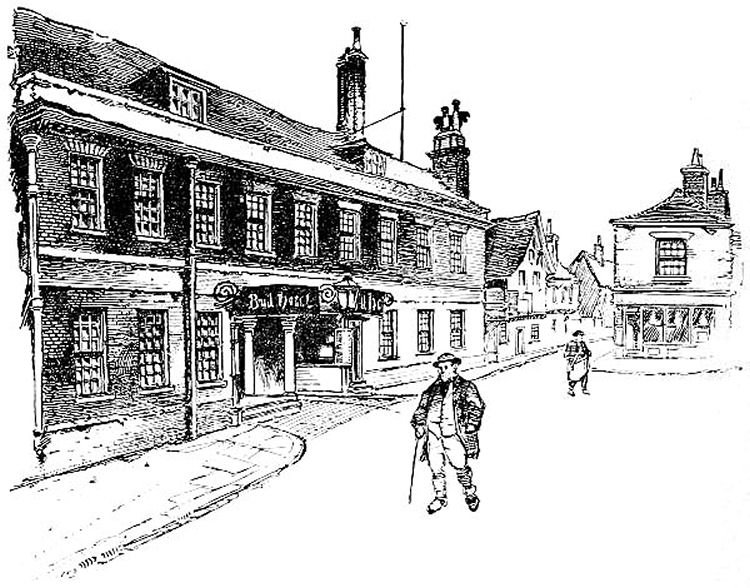
Above engraving circa 1895, taken from the book "The Old Dover Road." |
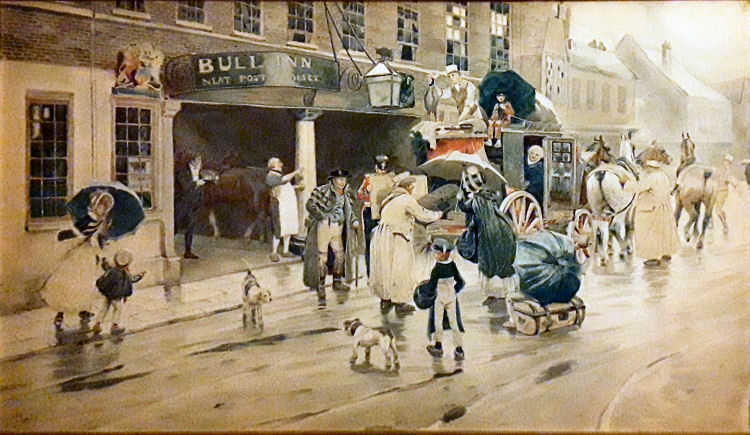
Above painting, circa 1900s, kindly sent by Pam Longridge. |
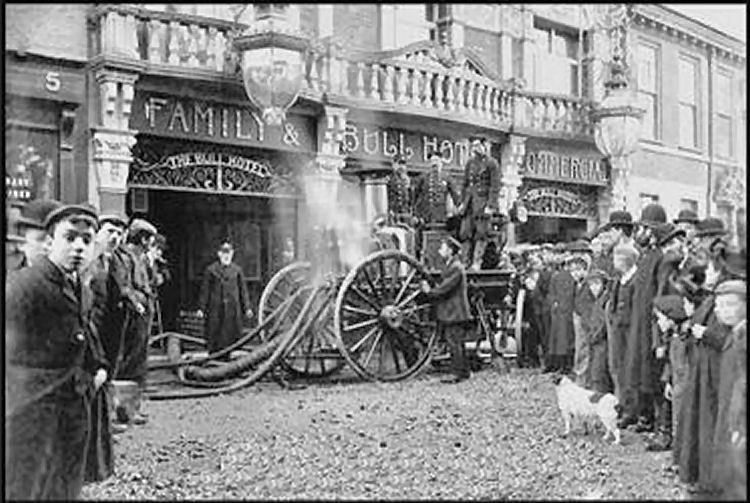
Above postcard, 1900, kindly sent by Rory Kehoe. |
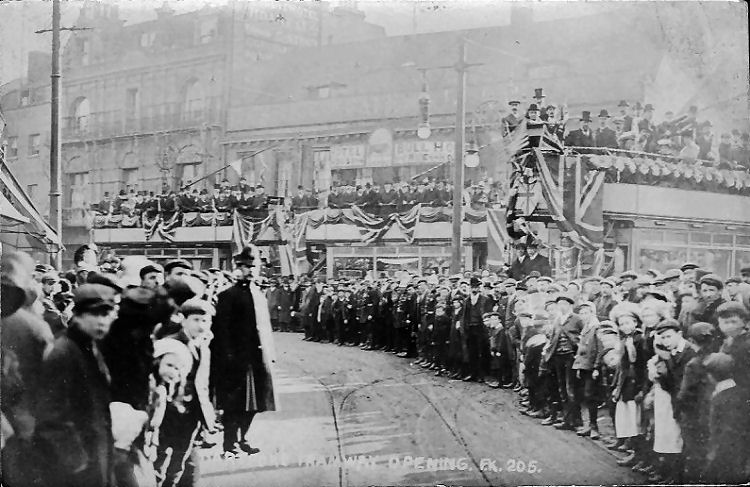
Above photo 1906, kindly sent by Rory Kehoe. |
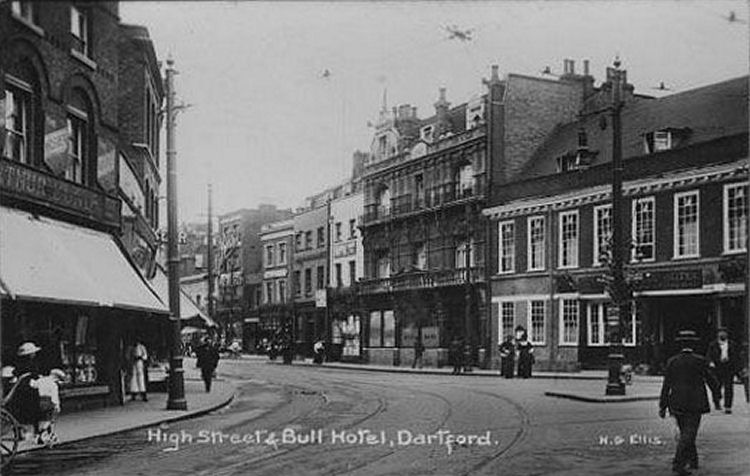
Above postcard, date unknown. |
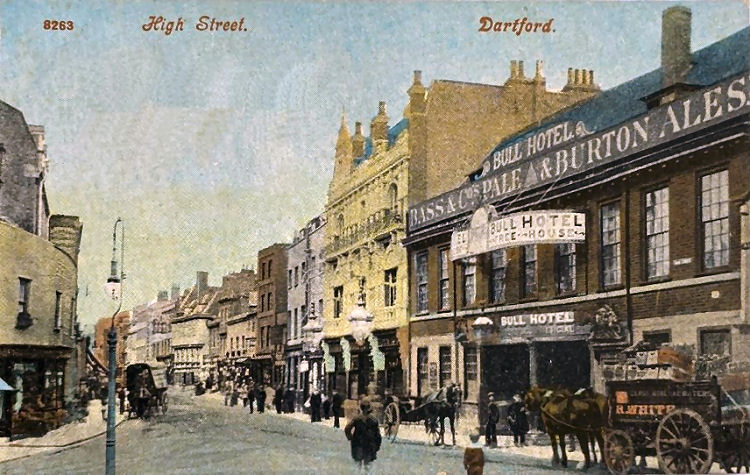
Above postcard, 1907, kindly sent by Rory Kehoe. With an R. White's
dray delivering cases of soft drinks. Robert and Mary White expanded
their home-brewed bottled ginger beer business, from just one market
barrow in the 1840s, to become the south east's leading soft drinks
company by WW1. |
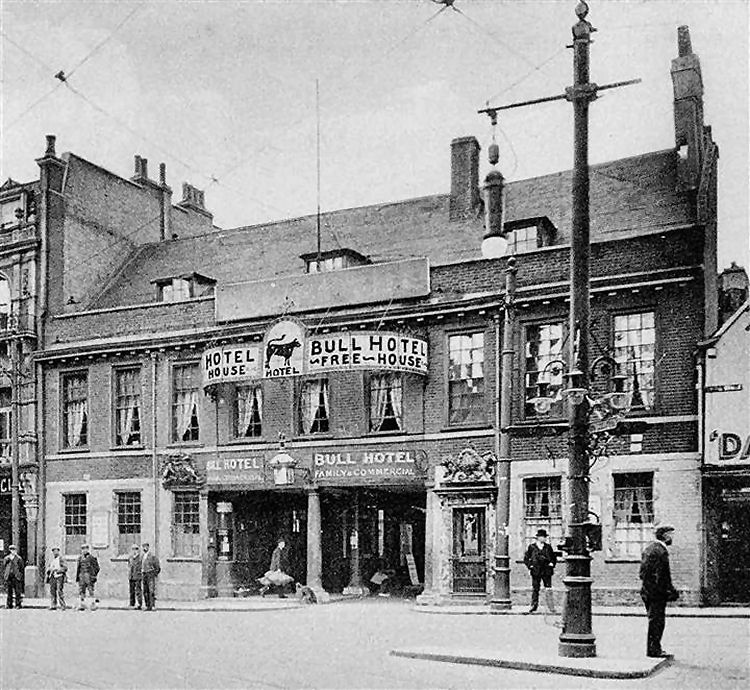
Above photo, 1910 from the Dartford Borough Museum. |
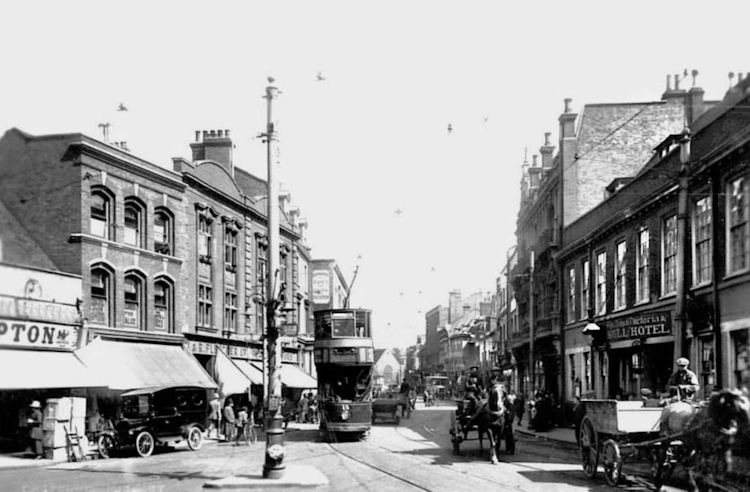
Above photo, 1920. |
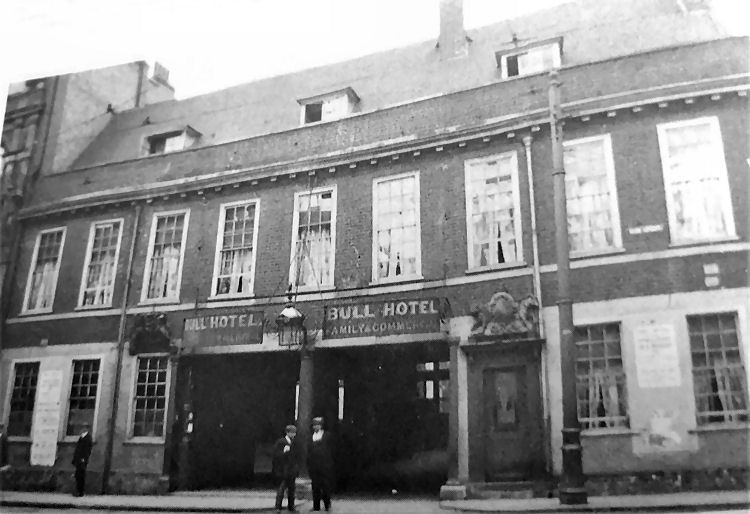
Above photo, date unknown. |

Above photo, date unknown. |

Above photo, date unknown. |
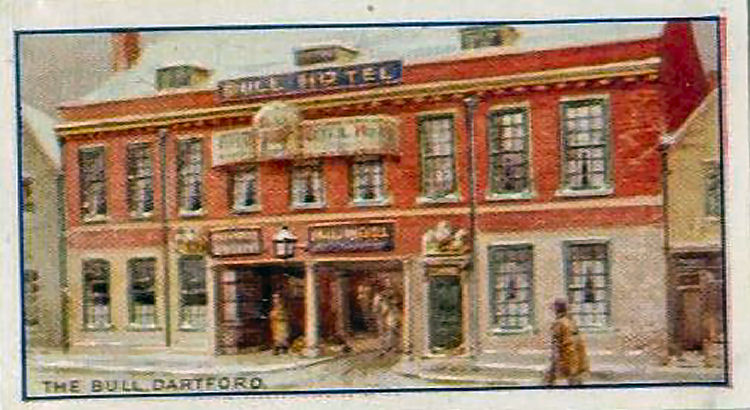
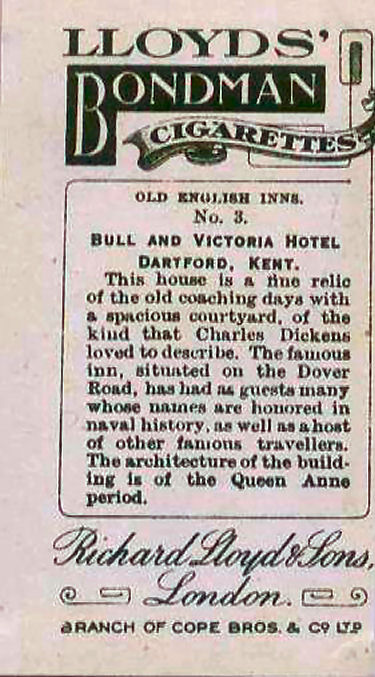
Above showing the front and back from Lloyds' Bondman cigarette cards
from the Old English Inns series. |
See also "Royal
Victoria and Bull Hotel." This obviously changed name after Queen
Victoria came to the throne in 1837, and gained its royal appointment.
|
By kind permission of the rector and parochial church council of Holy Trinity, Dartford (P110/1/10)
Burial entry for Richard Trevithick, buried in Dartford churchyard on 26 April 1833.
Born at Illogan in Cornwall in 1771, Trevithick who stood at 6' 2" was
nicknamed the Cornish giant. A tin miner with engineering talent,
Trevithick developed various forms of steam locomotive in Britain and
South America with varying degrees of success, dying at the "Bull Inn,"
Dartford in reduced circumstances on 22 April 1833.
The Engineering Magazine of 27 March 1868 noted Trevithick was the real
inventor of the locomotive. He was the first to prove the sufficiency of
the adhesion of the wheels on the rails for all purposes of traction on
lines of ordinary gradient, the first to make the return flue boiler,
the first to use the steam jet in the chimney, and the first to couple
all the wheels of the engine.
Trevithick is commemorated by a plaque in the church.
|
|
Ipswich Journal, Saturday 28 June 1783.
On Thursday last as Mr. William Robertson, and his nephew, Mr. Cormick,
were going home in the chariot to Clapham Common, at the second bridge
past Kennington turnpike, at half past 9 o'clock, they were attacked by
single highwayman, on a bay horse. Mr. Robertson dozing, and his nephew
asleep, the former heard some sprson speak to the coachman, and feeling
a horse prancing about with a genteel looking young man, imagined he
wanted to speak with his nephew; he therefore let down the glass, asking
who he wanted, was instantly presented with a pistol, "Sir, your money?"
Mr. Robertson with great deliberation, told him to have patience, and he
should; he gave him half a guinea and some silver, and his nephew
likewise what he had; he then demanded the watches. Mr. Roberts said he
never had one, and pulled up his waistcoat, and putting his hand upon
his thigh to convince him. His nephew, and had a watch, had, during this
time, put this aside, and putting his hand upon his pocket, to show he
had none - Mr. Robertson thinking his nephew might have some notes upon
him, and going home so early, did not think of putting them out of his
pockets, he, upon the highwayman's changing his pistol into his left
hand, and leaning to reach the watch, seized the highwayman, and pulled
him off his horse, called to his coachman, who with great readiness
sprung from the box, seized him fast, and carried him to the "Swan" at
Stockwell, where, upon searching him, found two pistols loaded, with
three square slugs, and a paper full of them, and powder in his pockets.
No justice been to be found, Mr. Robertson sent for a Stockwell
constable, and ordered his carriage (putting the constable and the
highwayman in, together with himself,) to drive to the New Gaol in the
Borough, where he lodged him. His name appears to be Gladwell, was late
a waiter at the "Bull Inn," Dartford, Kent,. He was next day committed
to take his trial at the assizes at Croydon.
|
|
From the Kentish Gazette, 12 January, 1810.
TO BE LET, And entered upon at Michaelmas, 1810, With or without the
following Land, or any part thereof.
THE "BULL INN," at Dartford, in Kent, one of the prettiest
thoroughfares in England, and about 50 Acres of Land, of which 40 or
thereabouts are Marsh Land, and the remainder Arable, situate in the
parish of Dartford. Further particulars may be had of Mr, Williams,
No. 50, Frith-street, Soho, London, or Messrs. Williams and Walker,
at Dartford.
|
|
From the Kentish Gazette, 27 July 1810.
BULL INN, DARTFORD.
JOHN ESSENHIGH, BEGS leave to inform the Nobility, Gentry, and
Public in general, travelling the Kent Road, (also the Friends of
Mr. Warton,) that he has taken the above Inn, Mr. Wm. Lease expiring
at Michaelmas next, and intends conducting it on the same principles
which Mr. Warton has done for so many years; and hopes, by assiduity
and strict attention, to merit their patronage and support.
Various reports having been circulated respecting the "Bull Inn"
being shut from the Public as a Post House, J. Essenhigh begs to
assure his Friends and the Public in general that he intends to
continue the Posting as usual.
NEAT POST CHAISE AND ABLE HORSES.
|
|
Kentish Gazette, 16 March 1852.
Dartford.
An interesting ploughing match came off on Wednesday, in a field
belonging to R. Wilkes, Esq., adjoining Dartford-brent, between two
sporting landlords of Dartford, viz. Mr. John Smith, of the "Marquis of
Granby Inn," and Mr. James Townsend, of the "Bull Inn tap," for half a
sovereign aside and a supper to plough for the straightest furrow. The
work was excellently performed. The umpires were unable to decide, when
an old and experienced farmer, Mr. Lucas, a stranger to both parties,
was passing, and was called in; his decision was that Mr. Smith's was
the smoothest work, and Mr. Townsend's the straightest furrow; the
latter was consequently declared the winner.
|
|
Southeastern Gazette, 16 August 1853.
Charles Crane and Benjamin Hollands, of Dartford, were charged
before James ’Espinasse, Esq. (at the rising of the County Court,
held at the Town-hall, on Monday), with stealing several trusses of
hay, belonging to Mr. Rowley Edward Potter, the proprietor of the "Victoria
Hotel," Dartford.
The prisoner Crane’s premises adjoin the stabling of Mr. Potter,
who has missed a considerable quantity of fodder lately, and Mr.
Pearce, a blacksmith residing in a house in Lowfield-street, which
overlooks the prisoner Crane’s premises, seeing him removing some
straw early on Sunday morning last, mentioned the fact to Mr.
Potter, who immediately gave instructions to the police upon the
subject, and Superintending-constable Thatcher, assisted by
police-constable White, succeeding in apprehending the prisoners,
which has resulted in their committal for trial. A young man named
Wm. Streatfield was also apprehended on the charge, but there being
no evidence against him he was discharged. The following evidence
was adduced before the committing magistrate.
Wm. Charles Pearce, of Dartford, blacksmith, deposed:- I live in
a house adjoining the premises of the "Bull Inn," in Dartford,
belonging to Mr. Potter. On Sunday morning, the 7th August, at about
five o’clock, I was looking from the window of one of the back rooms
in my house. I saw the prisoner Crane remove a truss of straw from
the back part of a shed on my premises; he took it down the yard
towards a stable in his occupation. He came back from the direction
of his stable to the back of my shed; he then took a truss of fodder
in the same direction, and came a second and third time and did the
same. The prisoner occupies the adjoining premises to me, and keeps
a horse and cart and sells bavins.
Frederick John Thatcher, inspector of the Dartford police, went
to the house of the prisoner with Mr. Potter, told the prisoner Mr.
Potter had lost some hay, and asked him to let them look in his
stable, to which prisoner replied "Yes, you may look in welcome, I
know of no fodder being there, for I have not carried any in nor
have I been in the stable for a week or ten days." In the stable
witness found six trusses of hay and two of straw piled one on the
other. Prisoner said he did not know how it came there, and denied
putting it there. Some hay was scattered about the prisoner’s
garden, and under a window of Mr. Potter’s stable, which abuts on
the garden.
William Barnes, ostler to Mr. Potter, identified the property.
Charles White, police-constable, Dartford, deposed that at about
one o’clock that afternoon he apprehended William Hollands, the
other prisoner, in a field in the occupation of Mr. Parkhurst, where
he was at work. Witness told him he took him into custody on a
charge of stealing some hay and straw, the property of Mr. Potter,
and selling it to Mr. Crane. He said the prisoner Crane has asked
him several times to get him some hay and straw, and last Sunday
morning he got him four trusses of hay and a truss of straw; that no
one carried it from the stable but himself; that he put it out of
the window and some man received it, and at about eight o’clock he
received 5s. of Crane for getting the hay and straw.
The prisoner Crane denied asking the other prisoner to get any.
Hollands, it appears, was in the habit of carting, the hay and straw
to Mr. Potter’s from Mr. Parkhurst’s, of whom the hay and straw was
bought, and the stable containing it was never locked.
They were both committed for trial.
Crane made application to be liberated on bail, which was
refused.
|
|
South Eastern Gazette, 18 September, 1860.
DARTFORD. County Court.
This court was held on Monday, before James Espinasse, Esq., Judge.
There were 108 causes entered for hearing, 3 of which were adjourned
causes, and 17 unsatisfied judgments. Several of the cases were,
however, struck out or settled before the court sat, and the
remainder were chiefly for very small amounts. The only one
possessing any features of interest was that of Hendon v. Bray, the
plaintiff being the landlord of the "One Bell," and the defendant
proprietor of the "Bull Hotel." The action was brought to recover
damages which plaintiff alleged had been sustained by a carriage
belonging to him, in consequence of one of the defendant’s servants
negligently driving against it whilst standing at the station. It
was expected that a question as to the right of the plaintiff to
place his vehicle in front of the station would have been raised,
but as the plaintiffs witness said that Mr. Bray’s man purposely
drove against his carriage, and committed the damage in question,
namely the breaking of one of the wheels, his Honour stopped the
case, holding that though an employer was liable for any damage
committed through the negligence of his servant, that was not the
case where the damage was wilfully done. The plaintiff was therefore
non-suited, the expenses of several witnesses subpoenaed by the
defendant being allowed.
|
|
Kent Times, 8 February 1862.
DARTFORD.
On Thursday an inquest was held at the "Bull Hotel," before C. J.
Carttar, Esq., coroner, on the body of Alexander Clark, aged 14
years, son of a chimney-sweep living in Sweep's-alley. Water-side.
The inquest was held on account of the parents being dissatisfied
with the treatment of the medical man, Dr. Martin.
Dr. Moorr, of Bridge house, Dartford, made a post mortem examination
of the body according to orders from the coroner, and gave it as his
opinion that the boy died of pleurisy aided by bad living. The
inquiry was adjourned for a fortnight to allow of the contents of
the stomach and also the remains of the medicine he had been taking
to be analysed.
|
|
From the Kentish Chronicle, 21 May, 1864.
SINGULAR DEATH OF A Child.
An inquest was held on Monday at the “Bull Hotel,” Dartford, before C.
J. Carttar, Esq., coroner, on the body of a child named Sarah Elizabeth
Heron, aged six years.
It appeared from the evidence of the mother and
father of the child that some time before death the deceased had
complained of being very unwell, and in great pain about the body and
legs. The mother afterwards discovered that the deceased had been eating
buttercups from a field close by, and sent for a powder from a
chemist's, but as the deceased vomited a great deal and presented every
appearance of having been poisoned, she hastened off for the parish
surgeon, Mr. Martin, who did not make his appearance at the house till
the child was dead. A post mortem examination had been made which
clearly proved the deceased had been poisoned by eating buttercups, and
the jury brought in a verdict to that effect, but thought that Mr.
Martin was to blame for not having attended sooner upon the deceased.
|
|
Gravesend Reporter, North Kent and South Essex Advertiser, Saturday 11 September 1869.
Dicks, Chemical Fire Engine.
A trial of the patent portable self-acting chemical fire engine took
place in the meadow at the rear of the "Bull Hotel" on Saturday
afternoon. A number of stakes were driven in the ground, and tar barrels
placed at the base. Upon these were pieces of wood, placed crossways,
and the vacuum filled with shavings, the whole being plentifully
besprinkled with inflammable liquid. This heap was soon fired, and in a
few minutes was one sheet of flame. The engines, commonly known as "L'Extincteur,"
were then brought to play on the burning mass, which was almost
immediately extinguished. Bowls of petroleum were then thrown upon a
debris and caused the flames to again make headway, bit directly the
machine was directed against it it was completely extinguished. |
|
Bromley & District Times, Friday 10 March 1893.
Licensed Victuallers Association.
The annual meeting of the Dartford and West Kent Licensed Victuallers'
Association was held at Mr. Lines,
"Bull Inn," on Wednesday afternoon, the 1st inst.
The annual report was read, and the financial statement showed the
balance in hand of £15.
Mr. Clayton of Erith, was re-elected chairman of the association; Mr. King
of Sevenoaks, vice-chairman; Mr.
Lines, treasurer, and Mr. J. C. Drew of Penge, retains his post as
secretary.
Some discussion took place with reference to the Local Option Bill now
before Parliament, but no definite
resolution was come to it being thought advisable to wait and see what
action the Trade of London should
take in regard to the Bill.
It may be noted that Mr. Clayton has been chosen as a delegate to
represent the Dartford and Sevenoaks
Association in the National Trade Defence League, or Fund as it is
called, and that Alderman Long (of
Maidstone), and Mr. William Sampson have been elected to represent the
trade of the Kent and
neighbouring counties in the same league.
|
|
The Daily News (Perth, WA : 1882 - 1950) Monday 15 October 1900.
MR. KRUGER IN KENT.
In nearly every town throughout the County of Kent may be found a
hostelry brazing the sign of the Bull.
Dartford is not peculiar from the rest In this respect. But in order to
distinguish it from the "Bull and George" in the same street the chief
hotel in Dartford is entitled the "Royal Victoria and Bull."
Chief among its relics of a bygone day are a number of nearly square
wooden four-post beds.
If these ancient couches could talk there is one in particular that
could a tale en-fold.
Hereon slept more than one Queen Elizabeth. Under the same canopy also
reclined soon after her accession to the throne Her Most Gracious
Majesty Victoria R. and I.
Likewise, on the occasion of his last visit to England, Mr. Kruger,
President of the late South African Republic, stretched himself in
repose behind the same white bed-curtains. How he managed to stow his
bulky frame comfortably in so relatively small a compass is not known.
Oom Paul was, however, thoroughly pleased with his visit, amusing
himself by trying on a huge black leather hat shaped like a sou'-wester,
many sizes too big for him, and generally assigned to Oliver Cromwell or
some one of his Ironsides. At the same time the Boer ex-President
explored a cleverly devised secret staircase, which had only recently
been discovered, and wherein the skeleton of a long dead man had been
found.
Oom Paul doubtless saw some of the other curiosities with which the old
place abounds, but probably none that would appeal to him more strongly
just now, when hard pressed for a safe and secret "way out."
|
See Dartford Map 1905.
LICENSEE LIST
WARTON Mr to July/1810
ESSENHIGH John July/1810+
 POTTER Edward 1828+
POTTER Edward 1828+

BAKER Sarah 1841+ (age 65 in 1841 )
("Bull Inn Tap") )
("Bull Inn Tap")
TOWNSEND James 1852+ ("Bull Inn Tap")
BRAY William Thomas 1860-64+
LINES Mr 1893+
RUSSELL Sidney 1901+ (hotel manager age 67 in 1901 ) )
https://pubwiki.co.uk/BullRoyalVictoria.shtml
 From the Pigot's Directory 1828-29 From the Pigot's Directory 1828-29
|












